#primer for the nuclear age
Text






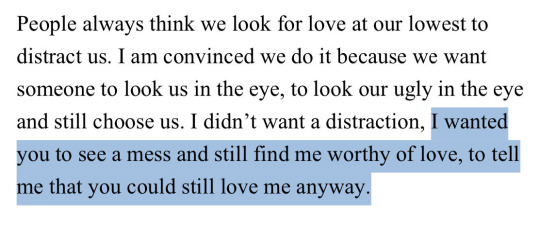



I would rather drown in your shadows than to swim in someone's else light
{Quote:Rita Dove, “Primer for the Nuclear Age”, Collected Poems 1974-2004 /Jenny Slate, Little Weirds / Albert Camus, The Possessed/Rita Dove, “Primer for the Nuclear Age”, Collected Poems 1974-2004/hishaam siddique/unknown/ Jennifer S. Cheng, from So We Must Meet Apart/fortesa latifi/ojibwa/puti era// paintings: pinterest}
#web weavings#web weave#dark acadamia aesthetic#dark acadamia quotes#dark acamedia#light acadamia aesthetic#light academia#classic literature#literature#lit#spilled poetry#grey academia#chaotic academia#chaotic academic aesthetic#cottage academia#books and quotes#books & libraries#artists on tumblr#writers and poets#art corner#art#words#quote#quotation#onlove#greif#writing#spilled thoughts#spilled writing#dark aesthetic
707 notes
·
View notes
Text

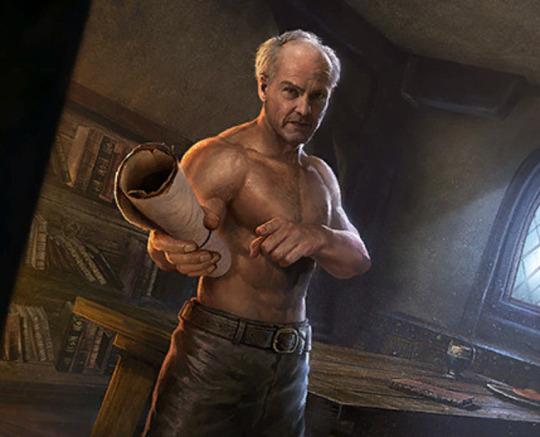
imperialism and science reading list
edited: by popular demand, now with much longer list of books
Of course Katherine McKittrick and Kathryn Yusoff.
People like Achille Mbembe, Pratik Chakrabarti, Rohan Deb Roy, Lizabeth Paravisini-Gebert, and Elizabeth Povinelli have written some “classics” and they track the history/historiography of US/European scientific institutions and their origins in extraction, plantations, race/slavery, etc.
Two articles I’d recommend as a summary/primer:
Zaheer Baber. “The Plants of Empire: Botanic Gardens, Colonial Power and Botanical Knowledge.” Journal of Contemporary Asia. May 2016.
Kathryn Yusoff. “The Inhumanities.” Annals of the American Association of Geographers. 2020.
Then probably:
Irene Peano, Marta Macedo, and Colette Le Petitcorps. “Introduction: Viewing Plantations at the Intersection of Political Ecologies and Multiple Space-Times.” Global Plantations in the Modern World: Sovereignties, Ecologies, Afterlives. 2023.
Sharae Deckard. “Paradise Discourse, Imperialism, and Globalization: Exploiting Eden.” 2010. (Chornological overview of development of knowledge/institutions in relationship with race, slavery, profit as European empires encountered new lands and peoples.)
Gregg Mitman. “Forgotten Paths of Empire: Ecology, Disease, and Commerce in the Making of Liberia’s Plantation Economy.” Environmental History. 2017, (Interesting case study. US corporations were building fruit plantations in Latin America and rubber plantations in West Africa during the 1920s. Medical doctors, researchers, and academics made a strong alliance these corporations to advance their careers and solidify their institutions. By 1914, the director of Harvard’s Department of Tropical Medicine was also simultaneously the director of the Laboratories of the Hospitals of the United Fruit Company, which infamously and brutally occupied Central America. This same Harvard doctor was also a shareholder in rubber plantations, and had a close personal relationship with the Firestone Tire and Rubber Company, which occupied West Africa.)
Elizabeth DeLoughrey. “Globalizing the Routes of Breadfruit and Other Bounties.” 2008. (Case study of how British wealth and industrial development built on botany. Examines Joseph Banks; Kew Gardens; breadfruit; British fear of labor revolts; and the simultaneous colonizing of the Caribbean and the South Pacific.)
Elizabeth DeLoughrey. “Satellite Planetarity and the Ends of the Earth.” 2014. (Indigenous knowledge systems; “nuclear colonialism”; US empire in the Pacific; space/satellites; the twentieth and twenty-first centuries.)
Fahim Amir. “Cloudy Swords.” e-flux Journal #115, February 2021. (”Pest control”; termites; mosquitoes; fear of malaria and other diseases during German colonization of Africa and US occupations of Panama and the wider Caribbean; origins of some US institutions and the evolution of these institutions into colonial, nationalist, and then NGO forms over twentieth century.)
Some of the earlier generalist classic books that explicitly looked at science as a weapon of empires:
Schiebinger’s Plants and Empire: Colonial Bioprospecting in the Atlantic World; Delbourgo’s and Dew’s Science and Empire in the Atlantic World; the anthology Colonial Botany: Science, Commerce, and Politics in the Early Modern World; Canzares-Esquerra’s Nature, Empire, and Nation: Explorations of the History of Science in the Iberian World.
One of the quintessential case studies of science in the service of empire is the British pursuit of quinine and the inoculation of their soldiers and colonial administrators to safeguard against malaria in Africa, India, and Southeast Asia at the height of their power. But there are so many other exemplary cases: Britain trying to domesticate and transplant breadfruit from the South Pacific to the Caribbean to feed laborers to prevent slave uprisings during the age of the Haitian Revolution. British colonial administrators smuggling knowledge of tea cultivation out of China in order to set up tea plantations in Assam. Eugenics, race science, biological essentialism, etc. in the early twentieth century. With my interests, my little corner of exposure/experience has to do mostly with conceptions of space/place; interspecies/multispecies relationships; borderlands and frontiers; Caribbean; Latin America; islands. So, a lot of these recs are focused there. But someone else would have better recs, especially depending on your interests. For example, Chakrabarti writes about history of medicine/healthcare. Paravisini-Gebert about extinction and Caribbean relationship to animals/landscape. Deb Roy focuses on insects and colonial administration in South Asia. Some scholars focus on the historiography and chronological trajectory of “modernity” or “botany” or “universities/academia,”, while some focus on Early Modern Spain or Victorian Britain or twentieth-century United States by region. With so much to cover, that’s why I’d recommend the articles above, since they’re kinda like overviews.Generally I read more from articles, essays, and anthologies, rather than full-length books.
Some other nice articles:
(On my blog, I’ve got excerpts from all of these articles/essays, if you want to search for or read them.)
Katherine McKittrick. “Dear April: The Aesthetics of Black Miscellanea.” Antipode. First published September 2021.
Katherine McKittrick. “Plantation Futures.” Small Axe. 2013.
Antonio Lafuente and Nuria Valverde. “Linnaean Botany and Spanish Imperial Biopolitics.” A chapter in: Colonial Botany: Science, Commerce, and Politics in the Early Modern World. 2004.
Kathleen Susan Murphy. “A Slaving Surgeon’s Collection: The Pursuit of Natural History through the British Slave Trade to Spanish America.” 2019. And also: “The Slave Trade and Natural Science.” In: Oxford Bibliographies in Atlantic History. 2016.
Timothy J. Yamamura. “Fictions of Science, American Orientalism, and the Alien/Asian of Percival Lowell.” 2017.
Elizabeth Bentley. “Between Extinction and Dispossession: A Rhetorical Historiography of the Last Palestinian Crocodile (1870-1935).” 2021.
Pratik Chakrabarti. “Gondwana and the Politics of Deep Past.” Past & Present 242:1. 2019.
Jonathan Saha. “Colonizing elephants: animal agency, undead capital and imperial science in British Burma.” BJHS Themes. British Society for the History of Science. 2017.
Zoe Chadwick. “Perilous plants, botanical monsters, and (reverse) imperialism in fin-de-siecle literature.” The Victorianist: BAVS Postgraduates. 2017.
Dante Furioso: “Sanitary Imperialism.” Jeremy Lee Wolin: “The Finest Immigration Station in the World.” Serubiri Moses. “A Useful Landscape.” Andrew Herscher and Ana Maria Leon. “At the Border of Decolonization.” All from e-flux.
William Voinot-Baron. “Inescapable Temporalities: Chinook Salmon and the Non-Sovereignty of Co-Management in Southwest Alaska.” 2019.
Rohan Deb Roy. “White ants, empire, and entomo-politics in South Asia.” The Historical Journal. 2 October 2019.
Rohan Deb Roy. “Introduction: Nonhuman Empires.” Comparative Studies of South Asia, Africa and the Middle East 35 (1). May 2015.
Lawrence H. Kessler. “Entomology and Empire: Settler Colonial Science and the Campaign for Hawaiian Annexation.” Arcadia (Spring 2017).
Sasha Litvintseva and Beny Wagner. “Monster as Medium: Experiments in Perception in Early Modern Science and Film.” e-flux. March 2021.
Lesley Green. “The Changing of the Gods of Reason: Cecil John Rhodes, Karoo Fracking, and the Decolonizing of the Anthropocene.” e-flux Journal Issue #65. May 2015.
Martin Mahony. “The Enemy is Nature: Military Machines and Technological Bricolage in Britain’s ‘Great Agricultural Experiment.’“ Environment and Society Portal, Arcadia. Spring 2021.
Anna Boswell. “Anamorphic Ecology, or the Return of the Possum.” 2018. And; “Climates of Change: A Tuatara’s-Eye View.”2020. And: “Settler Sanctuaries and the Stoat-Free State." 2017.
Katherine Arnold. “Hydnora Africana: The ‘Hieroglyphic Key’ to Plant Parasitism.” Journal of the History of Ideas - JHI Blog - Dispatches from the Archives. 21 July 2021.
Helen F. Wilson. “Contact zones: Multispecies scholarship through Imperial Eyes.” Environment and Planning. July 2019.
Tom Brooking and Eric Pawson. “Silences of Grass: Retrieving the Role of Pasture Plants in the Development of New Zealand and the British Empire.” The Journal of Imperial and Commonwealth History. August 2007.
Kirsten Greer. “Zoogeography and imperial defence: Tracing the contours of the Neactic region in the temperate North Atlantic, 1838-1880s.” Geoforum Volume 65. October 2015. And: “Geopolitics and the Avian Imperial Archive: The Zoogeography of Region-Making in the Nineteenth-Century British Mediterranean.” Annals of the Association of American Geographers. 2013,
Marco Chivalan Carrillo and Silvia Posocco. “Against Extraction in Guatemala: Multispecies Strategies in Vampiric Times.” International Journal of Postcolonial Studies. April 2020.
Laura Rademaker. “60,000 years is not forever: ‘time revolutions’ and Indigenous pasts.” Postcolonial Studies. September 2021.
Paulo Tavares. “The Geological Imperative: On the Political Ecology of the Amazon’s Deep History.” Architecture in the Anthropocene. Edited by Etienne Turpin. 2013.
Kathryn Yusoff. “Geologic Realism: On the Beach of Geologic Time.” Social Text. 2019. And: “The Anthropocene and Geographies of Geopower.” Handbook on the Geographies of Power. 2018. And: “Climates of sight: Mistaken visbilities, mirages and ‘seeing beyond’ in Antarctica.” In: High Places: Cultural Geographies of Mountains, Ice and Science. 2008. And:“Geosocial Formations and the Anthropocene.” 2017. And: “An Interview with Elizabeth Grosz: Geopower, Inhumanism and the Biopolitical.” 2017.
Mara Dicenta. “The Beavercene: Eradication and Settler-Colonialism in Tierra del Fuego.” Arcadia. Spring 2020.
And then here are some books:
Africa as a Living Laboratory: Empire, Development, and the Problem of Scientific Knowledge, 1870-1950 (Helen Tilley, 2011); Plants and Empire: Colonial Bioprospecting in the Atlantic World (Londa Schiebinger, 2004)
Red Coats and Wild Birds: How Military Ornithologists and Migrant Birds Shaped Empire (Kirsten A. Greer); The Empirical Empire: Spanish Colonial Rule and the Politics of Knowledge (Arndt Brendecke, 2016); Medicine and Empire, 1600-1960 (Pratik Chakrabarti, 2014)
Anglo-European Science and the Rhetoric of Empire: Malaria, Opium, and British Rule in India, 1756-1895 (Paul Winther); Peoples on Parade: Exhibitions, Empire, and Anthropology in Nineteenth-Century Britain (Sadiah Qureshi, 2011); Unfreezing the Arctic: Science, Colonialism, and the Transformation of Inuit Lands (Andrew Stuhl)
Fugitive Science: Empiricism and Freedom in Early African American Culture (Britt Rusert, 2017); Pasteur’s Empire: Bacteriology and Politics in France, Its Colonies, and the World (Aro Velmet, 2022); Colonizing Animals: Interspecies Empire in Myanmar (Jonathan Saha)
The Nature of German Imperialism: Conservation and the Politics of Wildlife in Colonial East Africa (Bernhard Gissibl, 2019); Curious Encounters: Voyaging, Collecting, and Making Knowledge in the Long Eighteenth Century (Edited by Adriana Craciun and Mary Terrall, 2019)
Frontiers of Science: Imperialism and Natural Knowledge in the Gulf South Borderlands, 1500-1850 (Cameron B. Strang); The Ends of Paradise: Race, Extraction, and the Struggle for Black Life in Honduras (Chirstopher A. Loperena, 2022); Mining Language: Racial Thinking, Indigenous Knowledge, and Colonial Metallurgy in the Early Modern Iberian World (Allison Bigelow, 2020); The Herds Shot Round the World: Native Breeds and the British Empire, 1800-1900 (Rebecca J.H. Woods); American Tropics: The Caribbean Roots of Biodiversity Science (Megan Raby, 2017); Producing Mayaland: Colonial Legacies, Urbanization, and the Unfolding of Global Capitalism (Claudia Fonseca Alfaro, 2023)
Domingos Alvares, African Healing, and the Intellectual History of the Atlantic World (James Sweet, 2011); A Temperate Empire: Making Climate Change in Early America (Anya Zilberstein, 2016); Educating the Empire: American Teachers and Contested Colonization in the Philippines (Sarah Steinbock-Pratt, 2019); Soundings and Crossings: Doing Science at Sea, 1800-1970 (Edited by Anderson, Rozwadowski, et al, 2016)
Possessing Polynesians: The Science of Settler Colonial Whiteness in Hawai’i and Oceania (Maile Arvin); Overcoming Niagara: Canals, Commerce, and Tourism in the Niagara-Great Lakes Borderland Region, 1792-1837 (Janet Dorothy Larkin, 2018); A Great and Rising Nation: Naval Exploration and Global Empire in the Early US Republic (Michael A. Verney, 2022); In the Museum of Man: Race, Anthropology, and Empire in France, 1850-1960 (Alice Conklin, 2013)
Visible Empire: Botanical Expeditions and Visual Culture in the Hispanic Enlightenment (Daniela Cleichmar, 2012); Tea Environments and Plantation Culture: Imperial Disarray in Eastern India (Arnab Dey, 2022); Drugs on the Page: Pharmacopoeias and Healing Knowledge in the Early Modern Atlantic World (Edited by Crawford and Gabriel, 2019)
Cooling the Tropics: Ice, Indigeneity, and Hawaiian Refreshment (Hi’ilei Kawehipuaakahaopulani Hobart, 2022); In Asian Waters: Oceanic Worlds from Yemen to Yokkohama (Eric Tagliacozzo); Yellow Fever, Race, and Ecology in Nineteenth-Century New Orleans (Urmi Engineer Willoughby, 2017); Turning Land into Capital: Development and Dispossession in the Mekong Region (Edited by Hirsch, et al, 2022); Mining the Borderlands: Industry, Capital, and the Emergence of Engineers in the Southwest Territories, 1855-1910 (Sarah E.M. Grossman, 2018)
Knowing Manchuria: Environments, the Senses, and Natural Knowledge on an Asian Borderland (Ruth Rogaski); Colonial Fantasies, Imperial Realities: Race Science and the Making of Polishness on the Fringes of the German Empire, 1840-1920 (Lenny A. Urena Valerio); Against the Map: The Politics of Geography in Eighteenth-Century Britain (Adam Sills, 2021)
Under Osman’s Tree: The Ottoman Empire, Egypt, and Environmental History (Alan Mikhail, 2017); Imperial Nature: Joseph Hooker and the Practices of Victorian Science (Jim Endersby); Proving Grounds: Militarized Landscapes, Weapons Testing, and the Environmental Impact of U.S. Bases (Edited by Edwin Martini, 2015)
Colonial Botany: Science, Commerce, and Politics in the Early Modern World (Multiple authors, 2007); Space in the Tropics: From Convicts to Rockets in French Guiana (Peter Redfield); Seeds of Empire: Cotton, Slavery, and the Transformation of the Texas Borderlands, 1800-1850 (Andrew Togert, 2015); Dust Bowls of Empire: Imperialism, Environmental Politics, and the Injustice of ‘Green’ Capitalism (Hannah Holleman, 2016); Postnormal Conservation: Botanic Gardens and the Reordering of Biodiversity Governance (Katja Grotzner Neves, 2019)
Botanical Entanglements: Women, Natural Science, and the Arts in Eighteenth-Century England (Anna K. Sagal, 2022); The Platypus and the Mermaid and Other Figments of the Classifying Imagination (Harriet Ritvo); Rubber and the Making of Vietnam: An Ecological History, 1897-1975 (Michitake Aso); A Billion Black Anthropocenes or None (Kathryn Yusoff, 2018); Staple Security: Bread and Wheat in Egypt (Jessica Barnes, 2023); No Wood, No Kingdom: Political Ecology in the English Atlantic (Keith Pluymers); Planting Empire, Cultivating Subjects: British Malaya, 1768-1941 (Lynn Hollen Lees, 2017); Fish, Law, and Colonialism: The Legal Capture of Salmon in British Columbia (Douglas C. Harris, 2001); Everywhen: Australia and the Language of Deep Time (Edited by Ann McGrath, Laura Rademaker, and Jakelin Troy); Subject Matter: Technology, the Body, and Science on the Anglo-American Frontier, 1500-1676 (Joyce Chaplin, 2001)
American Lucifers: The Dark History of Artificial Light, 1750-1865 (Jeremy Zallen); Ruling Minds: Psychology in the British Empire (Erik Linstrum, 2016); Lakes and Empires in Macedonian History: Contesting the Water (James Pettifer and Mirancda Vickers, 2021); Inscriptions of Nature: Geology and the Naturalization of Antiquity (Pratik Chakrabarti); Seeds of Control: Japan’s Empire of Forestry in Colonial Korea (David Fedman)
Do Glaciers Listen?: Local Knowledge, Colonial Encounters, and Social Imagination (Julie Cruikshank); The Fishmeal Revolution: The Industrialization of the Humboldt Current Ecosystem (Kristin A. Wintersteen, 2021); The Earth on Show: Fossils and the Poetics of Popular Science, 1802-1856 (Ralph O’Connor); An Imperial Disaster: The Bengal Cyclone of 1876 (Benjamin Kingsbury, 2018); Geographies of City Science: Urban Life and Origin Debates in Late Victorian Dublin (Tanya O’Sullivan, 2019)
American Hegemony and the Postwar Reconstruction of Science in Europe (John Krige, 2006); Carnal Knowledge and Imperial Power: Race and the Intimate in Colonial Rule (Ann Laura Stoler, 2002); Rivers of the Sultan: The Tigris and Euphrates in the Ottoman Empire (Faisal H. Husain, 2021);
The Sanitation of Brazil: Nation, State, and Public Health, 1889-1930 (Gilberto Hochman, 2016); The Imperial Security State: British Colonial Knowledge and Empire-Building in Asia (James Hevia); Japan’s Empire of Birds: Aristocrats, Anglo-Americans, and Transwar Ornithology (Annika A. Culver, 2022)
Moral Ecology of a Forest: The Nature Industry and Maya Post-Conservation (Jose E. Martinez, 2021); Sound Relations: Native Ways of Doing Music History in Alaska (Jessica Bissette Perea, 2021); Citizens and Rulers of the World: The American Child and the Cartographic Pedagogies of Empire (Mashid Mayar); Anthropology and Antihumanism in Imperial Germany (Andrew Zimmerman, 2001)
The Botany of Empire in the Long Eighteenth Century (Multiple authors, 2016); The Nature of Slavery: Environment and Plantation Labor in the Anglo-Atlantic World (Katherine Johnston, 2022); Seeking the American Tropics: South Florida’s Early Naturalists (James A. Kushlan, 2020); The Postwar Origins of the Global Environment: How the United Nations Built Spaceship Earth (Perrin Selcer, 2018)
The Colonial Life of Pharmaceuticals: Medicines and Modernity in Vietnam (Laurence Monnais); Quinoa: Food Politics and Agrarian Life in the Andean Highlands (Linda J. Seligmann, 2023) ; Critical Animal Geographies: Politics, intersections and hierarchies in a multispecies world (Edited by Kathryn Gillespie and Rosemary-Claire Collard, 2017); Spawning Modern Fish: Transnational Comparison in the Making of Japanese Salmon (Heather Ann Swanson, 2022); Imperial Visions: Nationalist Imagination and Geographical Expansion in the Russian Far East, 1840-1865 (Mark Bassin, 2000); The Usufructuary Ethos: Power, Politics, and Environment in the Long Eighteenth Century (Erin Drew, 2022)
Intimate Eating: Racialized Spaces and Radical Futures (Anita Mannur, 2022); On the Frontiers of the Indian Ocean World: A History of Lake Tanganyika, 1830-1890 (Philip Gooding, 2022); All Things Harmless, Useful, and Ornamental: Environmental Transformation Through Species Acclimitization, from Colonial Australia to the World (Pete Minard, 2019)
Practical Matter: Newton’s Science in the Service of Industry and Empire, 1687-1851 (Margaret Jacob and Larry Stewart); Visions of Nature: How Landscape Photography Shaped Setller Colonialism (Jarrod Hore, 2022); Timber and Forestry in Qing China: Sustaining the Market (Meng Zhang, 2021); The World and All the Things upon It: Native Hawaiian Geographies of Exploration (David A. Chang);
Deep Cut: Science, Power, and the Unbuilt Interoceanic Canal (Christine Keiner); Writing the New World: The Politics of Natural History in the Early Spanish Empire (Mauro Jose Caraccioli); Two Years below the Horn: Operation Tabarin, Field Science, and Antarctic Sovereignty, 1944-1946 (Andrew Taylor, 2017); Mapping Water in Dominica: Enslavement and Environment under Colonialism (Mark W. Hauser, 2021)
To Master the Boundless Sea: The US Navy, the Marine Environment, and the Cartography of Empire (Jason Smith, 2018); Fir and Empire: The Transformation of Forests in Early Modern China (Ian Matthew Miller, 2020); Breeds of Empire: The ‘Invention’ of the Horse in Southeast Asia and Southern Africa 1500-1950 (Sandra Swart and Greg Bankoff, 2007)
Science on the Roof of the World: Empire and the Remaking of the Himalaya (Lachlan Fleetwood, 2022); Cattle Colonialism: An Environmental History of the Conquest of California and Hawai’i (John Ryan Fisher, 2017); Imperial Creatures: Humans and Other Animals in Colonial Singapore, 1819-1942 (Timothy P. Barnard, 2019)
An Ecology of Knowledges: Fear, Love, and Technoscience in Guatemalan Forest Conservation (Micha Rahder, 2020); Empire and Ecology in the Bengal Delta: The Making of Calcutta (Debjani Bhattacharyya, 2018); Imperial Bodies in London: Empire, Mobility, and the Making of British Medicine, 1880-1914 (Kristen Hussey, 2021)
Biotic Borders: Transpacific Plant and Insect Migration and the Rise of Anti-Asian Racism in America, 1890-1950 (Jeannie N. Shinozuka); Coral Empire: Underwater Oceans, Colonial Tropics, Visual Modernity (Ann Elias, 2019); Hunting Africa: British Sport, African Knowledge and the Nature of Empire (Angela Thompsell, 2015)
327 notes
·
View notes
Text
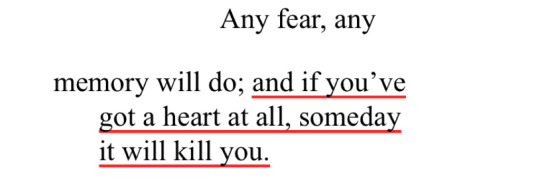
Rita Dove, from Collected Poems 1974-2004; “Primer for the Nuclear Age”
[Text ID: “Any fear, any / memory will do; and if you’ve / got a heart at all, someday / it will kill you.”]
#rita dove#fear#memory#heart#sadness#ache#pain#excerpts#writings#literature#poetry#fragments#selections#words#quotes#typography#poetry collection
643 notes
·
View notes
Text
happy pride reccing some anti-assimilationist, anti-capitalist, and abolitionist books and texts
BOOKS
Why Are Faggots So Afraid of Faggots? edited by Matilda Bernstein Sycamore (2012)
"Whatever happened to sexual flamboyance and gender liberation, an end to marriage, the military, and the nuclear family? As backrooms are shut down to make way for wedding vows, and gay sexual culture morphs into "straight-acting dudes hangin' out," what are the possibilities for a defiant faggotry that challenges the assimilationist norms of a corporate-cozy lifestyle?"
Transgender Liberation: A Movement Whose Time Has Come by Leslie Feinberg (1992)
This pamphlet is an attempt to trace the historic rise of an oppression that, as yet, has no commonly agreed name. We are talking here about people who defy the ‘man’-made boundaries of gender.
Transgender Warriors: Making history from Joan of Arc to Dennis Rodman by Leslie Feinberg (1996)
[Leslie Feinberg's] book celebrated the resistance to transphobia and a vision of trans liberation articulated from the perspective of class struggle. It understood that no liberation from transphobia or any of the divisive and violent oppressions in class society is possible without the transformation of capitalism into socialism.
The Faggots & Their Friends Between Revolutions by Larry Mitchell (1977)
Stories told of these times make the faggots and their friends weep. The second revolutions made many of the people less poor and a small group of men without color very rich. With craftiness and wit the faggots and their friends are able to live in this time, some in comfort and some in defiance.
Also this interview
Gender Outlaws: The Next Generation edited by Kate Bornstein, and S. Bear Bergman (2010)
Today's transgenders and other sex/gender radicals are writing a drastically new world into being.
Made In India: Decolonizations, Queer Sexualities, Trans/National Projects by Suparna Bhaskaran (2004)
Made In India explores the making of "queer" and "heterosexual" consciousness and identities in light of economic privatization, global condom enterprises, sexuality-focused NGOs, the Bollywood-ization of beauty contests, and trans/national activism.
That's Revolting: Queer Strategies For Resisting Assimilation edited by Matilda Bernstein Sycamore (2008)
As the growing gay mainstream prioritises the attainment of straight privilege over all else, it drains queer identity of any meaning, relevance or cultural value.
How To Blow Up A Pipeline by Andreas Malm (2021)
Malm argues that sabotage is a logical form of climate activism, and criticizes both pacifism within the climate movement and "climate fatalism" outside it.
On Connection by Kae Tempest (2020)
On Connection is medicine for these wounded times.
Are Prisons Obsolete by Angela Y. Davies (2003)
If you know anything about Angela Davis—anti-racist activist, Marxist-feminist scholar—you know that her answer to the question posed in the title is "Yes." This is a short primer on the prison abolition movement
Becoming Abolitionists: Police, Protests, and the Pursuit of Freedom by Derecka Purnell
This profound, urgent, beautiful, and necessary book is an invitation to imagine and organize for a less violent and more liberatory world.
Black Marxism by Cedric Johnson (1983)
Influenced by many African American and Black economists and radical thinkers of the 19th century, Robinson creates a historical-critical analysis of Marxism and the Eurocentric tradition from which it evolved. The book does not build from nor reiterate Marxist thought, but rather introduces racial analysis to the Marxist tradition.
The Transgender Issue: An Argument For Justice by Shon Faye (2021)
[Shon Faye] provides a compelling, wide-ranging analysis of trans lives from youth to old age, exploring work, family, housing, healthcare, the prison system and trans participation in the LGBTQ+ and feminist communities, in contemporary Britain and beyond.
Burn The Binary: selected writings on the politics of being trans, genderqueer, and non-binary by Riki Wilchins (2017)
This single volume offers a selection of Riki’s most penetrating and insightful pieces, as well as the best of two decades of Riki’s online columns for The Advocate never before collected, from "Where Have All the Butches Gone," to "Attack of the 6-Foot Intersex People"
ARTICLES
Assuming The Perspective Of The Ancestor by Claire Schwartz (2022)
Philosopher Olúfẹ́mi O. Táíwò on building constructive, future-oriented politics, at scale.
The Gender Binary Is A Tool For White Supremacy by Kravitz Marshall (2020)
A brief history of gender expansiveness - and how colonialism slaughtered it
Meet Chris Smalls, the man who organized Amazon workers in New York By Anna Betts, Greg Jaffe, and Rachel Lerman (2022)
The fired worker and former rapper did what nobody else has done in the U.S.
The Nuclear Family Was A Mistake by David Brooks (2020)
The family structure we’ve held up as the cultural ideal for the past half century has been a catastrophe for many. It’s time to figure out better ways to live together.
Universal basic income seems to improve employment and well-being by Donna Lu (2020)
Extinction Isn’t the Worst That Can Happen by Kai Heron (2021)
"This brings us to the third problem with eschatological framings of the climate crisis: they overlook the fact that for many, the end of the world has already happened. In October last year, Nemonte Nenquimo, a Waorani woman, mother and leader, wrote a desperate letter to the western world reminding us that for Indigenous peoples, “the fires are raging still”."
MISC
Manifesto: An Aromantic Manifesto by yingchen and yingtong
free to read
their tumblr (with further resources)
Essay: I Dream Of Canteens by Rebecca May Johnson (2019)
There is a space for everyone. A space, a glass of water, and a plug socket.* Chairs and tables and cleaned toilets. So many chairs so that no one is without one.
Acceptance Speech (video and text): The National Book Foundation Medal for Distinguished Contribution to American Letters speech by Ursula Le Guin
Hard times are coming, when we’ll be wanting the voices of writers who can see alternatives to how we live now, can see through our fear-stricken society and its obsessive technologies to other ways of being, and even imagine real grounds for hope.
And here's a video to cleanse the soul: bell hooks: Transgression
bell hooks & Gloria Steinem at Eugene Lang College
#happy pride#leslie feinberg#ursula le guin#bell hooks#kate bornstein#queer literature#trans literature#marxist literature#black literature#political lit#andreas malm#rebecca may johnson#kai heron#kae tempest#matilda bernstein sycamore#angela davies#shon faye#riki wilchins#larry mitchell#s bear bergman#Suparna Bhaskaran#derecka purnell#cedric johnson#Olúfẹ́mi O. Táíwò#chris smalls#yingchen#yingtong#if anyone has anything from outside america or the uk (there are a few but not a lot here) + more on disability activism +#more on intersex activism#i haven't read *fixing sex* yet so dunno if it fits this exact list
1K notes
·
View notes
Text
Intro to Scouting for Nancy Drew Fans
i love to see Ace's Eagle Scout status come up in fics. Although it was almost a throw-away line, I think it informs Ace's character and fleshes out his backstory well, beyond just knowing knots and navigating the woods. But I see a lot of awkward phrasing, and I see a lot of missed opportunities to bring it up, and it got me wondering if a little primer would be helpful.
Things Ace could say: "I learned this in Boy Scouts." "My troop leader took us out here all the time." "This trail didn't go this way back when I was in Scouts." "Don't worry, they love me here--my eagle project was to clean up this beach." "Don't talk to me about Jared Spriggs-- I'll never forgive him for what he did to my derby car when I was 14."
Eagle Scout is a rank and an honor that he achieved, not a program he was in. The program is Boy Scouts of America (BSA). People familiar with the program will just say Boy Scouts or Scouts. After 100 years of only allowing boys to participate, the program became co-ed in 2019, so it's now called Scouts BSA, not Boy Scouts. Ace would have grown up in the program before then since he turned 18 in 2016.
If Ace started in scouting before he was 11, he would have been in Cub Scouts. At 11, he could move up to the scouting troop. There are ranks in scouting, tied to the number of merit badges you've earned. Eagle Scout is the top rank and must be achieved before the age of 18. It involves a certain number of merit badges, hours of volunteer work, and a main Eagle Scout Service Project that they must plan and execute themselves (with assistance from scout leaders and parents).
I think it highly likely that the Captain was a troop leader or otherwise involved in scouting, especially before his accident. I can see his mom stepping in as well- if I remember right, women could be pack leaders even before 2016.
Although most people work toward Eagle as 16-17 year olds, it's possible to achieve it earlier, especially if you're smart and committed like Ace. So his pot-smoking days could come after he earned Eagle and lost interest in Scouts, or they could coexist. Your call.
Although people assume scouting is about wilderness preparedness, the program's goal is to create well-rounded, responsible citizens. Ace would have the Oath and Law memorized.
Scout Oath
On my honor I will do my best
To do my duty to God and my country
and to obey the Scout Law;
To help other people at all times;
To keep myself physically strong,
mentally awake, and morally straight.
Scout Law
A Scout is: Trustworthy, Loyal, Helpful, Friendly, Courteous, Kind, Obedient, Cheerful, Thrifty, Brave, Clean, Reverent
As you can guess, being Jewish might have been tricky for Ace in a program that's culturally Christian as many 20th century American institutions are. That'd also depend on what his troop was like--was there one troop for the whole town, or maybe his synagogue hosted a troop?
There's a Sea Scouts program. Where I'm from is landlocked so I don't know anything about it, but Horseshoe Bay or a nearby bigger town would definitely have Sea Scouting!
Lastly, here are the current Merit Badge categories: it covers a lot more than knots! Ace often gets into hacking in pre-series fics by hanging out at the library with his mom after school. But what if he was introduced to programming in Scouts? And I'm sure Florence helped him complete many merit badges.
Automotive Maintenance
Backpacking
Bird Study
Camping
Canoeing
Chemistry
Coin Collecting
Cooking
Digital Technology
Engineering
Fire Safety
First Aid
Fly-Fishing
Golf
Indian Lore
Insect Study
Journalism
Law
Mining in Society
Nuclear Science
Photography
Plant Science
Programming
Radio
Safety
Scouting Heritage
Skating (I know we never see him on a skateboard but come on)
Surveying
Sustainability
Swimming (the way Ace is built heavier in top looks like a competitive swimming shape in my experience!)
35 notes
·
View notes
Photo
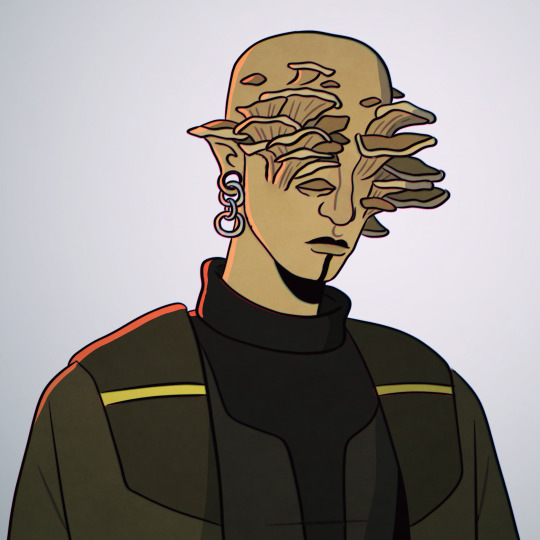

(quote from Primer for the Nuclear Age by Rita Dove)
im playing a new game of hyperlanes and this is my psychic fungoid ambassador, XYXYS K’8!
🍄 kofi link in bio if you’re feeling generous 🍄
161 notes
·
View notes
Note
Sae!


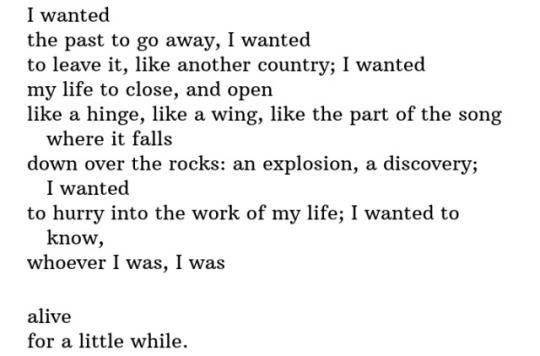
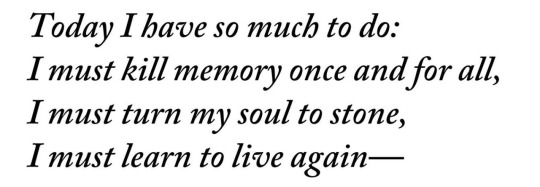
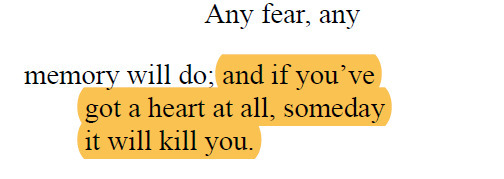
“ITOSHI SAE” - Memories of a Perfect Childhood.
Suzanne Rivecca - “Ugly, Bitter, and True” / Franz Wright, from God's Silence; - "Father Roger Goes for a Walk" / Mary Oliver - “Dogfish” / Anna Akhmatova - “The Sentence” / Rita Dove - “Primer For The Nuclear Age”.
#i lied <3#this was not a poem…#but these are the first ones I associate with Sae that I could find#so mh yeah#blue lock web weaving#blue lock#bllk#blue lock manga#bllk manga#blue lock anime#bllk anime#itoshi sae#web weaving#poetry#ask game!#send me characters and i’ll gove you a poem!
80 notes
·
View notes
Photo
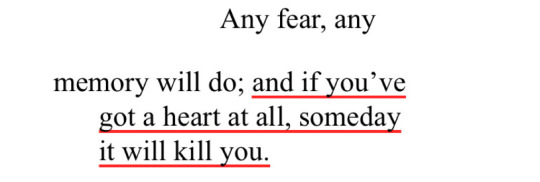
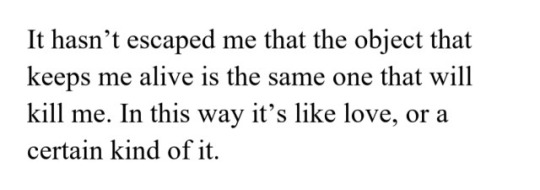




this love will kill you
primer for the nuclear age - rita dove // margaret atwood // unknown // i’m not calling you a liar - florence and the machine // joan tierney // call me what you like - lovejoy
22 notes
·
View notes
Text
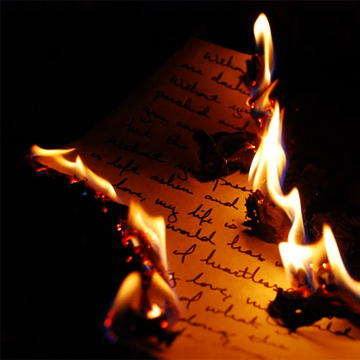
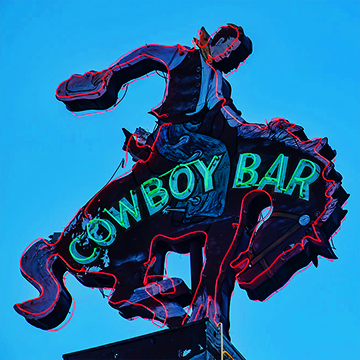
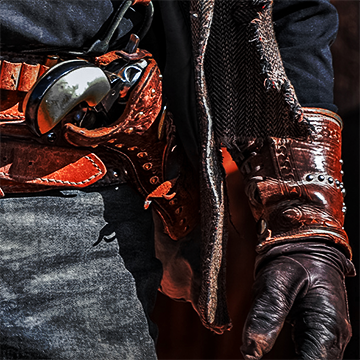



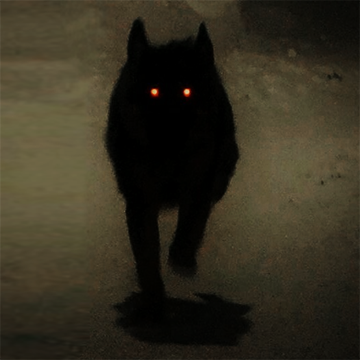
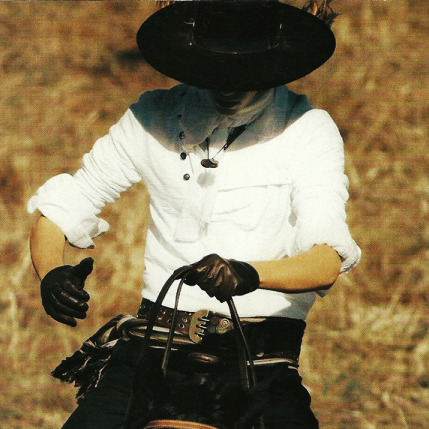

"Any fear, any memory will do; and if you’ve got a heart at all, someday - it will kill you." - Rita Dove, Primer for the Nuclear Age
name: dacre "mercy" hirsch
species: were-coyote (born), hellhound (made)
connection to the cherry pit: bodyguard, hunter for-hire
character connections: sloan (@arealcrow; having known each other since The Old Days, they are rivals [omg they were rivals], with sloan also being his self-appointed interior decorator), yuna (@gelvaan; benefactor, "aren't you tired of being nice? don't you just want to get revenge go apeshit?", dacre made a deal with her long ago that gave him his extra abilities)
open to connections: any
random note about dacre: an unparalleled marksman, dacre is known for always smiling - though it rarely reaches his eyes. much older than he appears and with a distinct drawl still present in his voice, he works as hired muscle for rome; but he will gladly take on any job, provided the price is right.
#thecherrypit.#opal.txt#oc tag: dacre#it took me foreeeeever to hunt down the right pictures for this lad smh smh
13 notes
·
View notes
Text
Klaus Schwab: el empresario nazi gurú del transhumanismo
Klaus Schwab pertenece a una familia suiza de colaboradores nazis, como señala un reportaje de Johnny Vedmore publicado en Unlimited Hangout (1):
“Especialmente reveladora es la historia del padre de Klaus, Eugen Schwab, que dirigió la rama alemana de una empresa de ingeniería suiza, apoyada por los nazis, actuando en la guerra como un destacado contratista militar. Esa empresa, Escher-Wyss, utilizó mano de obra esclava para producir maquinaria fundamental para el esfuerzo bélico nazi, así como para el esfuerzo de los nazis por producir agua pesada para su programa nuclear. Años más tarde, en la misma empresa, el joven Klaus Schwab formaba parte del consejo de administración cuando se tomó la decisión de suministrar al régimen racista del apartheid de Sudáfrica el equipo necesario para avanzar en su intento de convertirse en una potencia nuclear.”
Sobre Klaus Schwab, la Red Voltaire (2) afirma que:
“El alemán Klaus Schwab fue alumno del ex secretario de Estado Henry Kissinger en la Escuela de Gobierno de Harvard.
Después, en los años 1970-1980, Schwab fue uno de los directores de la firma Escher-Wyss (posteriormente absorbida por Sulzer AG), que desempeñó un importante papel en el programa sudafricano de investigación nuclear, desarrollado bajo el régimen del apartheid y en violación de la resolución 418 del Consejo de Seguridad de la ONU.
Con ayuda del vicepresidente de la Comisión Europea encargado de los temas económicos, Raymond Barre –ex primer ministro francés y miembro de la Comisión Trilateral–, Klaus Schwab creó un círculo de jefes de empresas que se convirtió en lo que se conoce como el Foro Económico Mundial de Davos. El cambio de denominación se realizó con ayuda del Center for International Private Enterprise (CIPE), la rama patronal de la National Endowment for Democracy (NED) –que sirve a su vez de pantalla a la CIA. Es por eso que, en 2016, Schwab aparece registrado en el Grupo de Bilberberg –órgano de influencia de la OTAN– como funcionario internacional, aunque nunca lo ha sido oficialmente.
Nacido en una familia de colaboradores nazis, el alemán Klaus Schwab dice ser «transhumanista» y promotor de la «globalización equitativa».”
Aunque ni la propia Wikipedia se anima a escribir algo sobre la familia del oscuro personaje Klaus Schwab, se sabe que la historia no enseña por identidad, sino por analogía, y que la aristocracia europea suele infiltrar cortesanos y aristócratas de menor rango en la dirección de las estructuras de poder supranacional con el objetivo de llevar a cabo sus agendas (3).
También es evidente que con o sin vínculos de parentesco, la ideología, los intereses, la forma de pensar y los compromisos de Klaus Schwab, el linaje Rothschild y el nuevo imperio anglo-veneciano, son los mismos.
Sobre el desempeño de Klaus Schwab en el Foro Económico Mundial, Mark Bender dijo lo siguiente en un artículo de febrero de 2021, publicado por Executive Intelligence Review (4):
“El Foro Económico Mundial (FEM), dominado en sus últimas conferencias por el Príncipe Carlos, Mark Carney y Klaus Schwab, es el principal impulsor de una nueva coalición de poderes empresariales e institucionales que ahora pretende de romper los propios cimientos de la economía humana. El surgimiento de esta coalición, está dirigida directamente contra los elementos primarios de la producción industrial al llamarlos ‘contaminantes de carbono’.”
William Engdahl escribió lo siguiente en la misma revista en febrero de 1997 (5):
“El Foro Económico Mundial de Davos fue creado en 1971 por el empresario suizo Klaus Schwab. La visión del mundo de Schwab se formó durante la década de 1960 como alumno de los seminarios de Harvard de Henry Kissinger, que también es un asiduo de Davos. El modelo de Schwab para la reunión de Davos, reconoce, proviene de la asistencia a las reuniones del secretista Grupo Bilderberg. Schwab desarrolló el formato de una reunión de élite muy cara (cada delegado debe pagar entre 16.000 y 20.000 dólares para asistir) en los Alpes suizos, que se centraría en las principales preocupaciones de la clase dirigente mundial de la banca, el gobierno y los negocios. Cada año, más de 1.000 delegados y ponentes se reúnen durante varios días en sesiones públicas, pero sobre todo en charlas privadas informales. En ellas se perfilan políticas y acuerdos de importancia estratégica. Quién es invitado y quién no, se toma como una señal de ‘aceptación’ política por parte de este establishment globalista.”
Se le suele dar un papel excesivamente importante al clan de los Rothschild, pero en realidad estos sólo se desempeñan como testaferros y administradores de la riqueza de cerca de una docena de familias como los Reading, los Samuel, los Fleming y los Keswick, según afirma el historiador ruso Andrei Fursov (6):
“Son todo un equipo y los Rothschild son sólo su fachada. Pero la gente sólo escribe sobre los Rothschild. Y desde mi punto de vista, si se escribe tanto de los Rothschild y poco de otras familias es porque estas familias son cosa seria y se protegen bien. Todo mundo sabe de los Rothschild y los Rockefeller. Y ellos han sido especialmente enfocados como centro de atención para que todo lo demás permanezca detrás de escena.”
Este es nuestro amigo Klaus, uno de los principales ideólogos del transhumanismo, de la 4ª revolución industrial y el principal promotor del gran reinicio del Foro Económico Mundial, lo que podría considerarse como la rama económica y tecnológica de la agenda 2030. Toda una joya, el amigo Klaus.
Notas
(1) Johnny Vedmore, en Unlimited Hangout: Schwab Family Values.
(2) Red Voltaire: ¿Quién es Klaus Schwab?
(3) Mente Alternativa: Tres cortesanos que la nobleza negra ha usado para moldear la estructura supranacional de la unión europea.
(4) Mark Bender: WEF’s ‘Mission Possible’ Targets The Building Blocks of Human Society; en Executive Intelligence Review: The Great Leap Backward: LaRouche Exposes the Green New Deal; 12 de febrero de 2021.
(5) William Engdahl: World financial elites focus on systemic crisis in Davos, en Executive Intelligence Review, February 21 de enero de 1997.
(6) Andrei Fursov: El rol de los Rothschild en el Imperio Británico (entrevista subtitulada del ruso al inglés).
5 notes
·
View notes
Note
2 for boycows
prompts
“Any fear, any memory will do; and if you’ve got a heart at all, someday it will kill you.” - Rita Dove, Primer for the Nuclear Age
Will doesn’t usually let Antonia play near the water.
It makes a kind of sense; she’s only small, and grown men have drowned in shallower waters than the little creek. But, on the other hand, he’s gone and created the lure of the forbidden, and she’ll never learn to swim if she isn’t allowed the risk some time. The water sparkles in the sunlight like so many diamonds, the breeze kicks up a pleasant coolness in comparison to the heat of the day, and it’s somewhere she simply hasn’t been. The newness of it calls to her.
He’s sitting a ways off anyway, down to his shirtsleeves even in the shade of the trees here at the divide of the woods and the prairie, and scribbling away in his notebook. He’d shown her the lines of marching ants like tree roots, drawing in food and resources to the great, shifting lump of dirt and twigs in the deeper forest. She had been heartily instructed to keep away from that, too, but in all honesty that had been unnecessary; Antonia sees the interest in the lines, all those little adventurers off on their explorations, but the nest itself is rather repellant. Besides, half the fun of looking at what Will is looking at is being tucked up in his lap, or standing between his legs, or carried on his shoulders, and informed in gentle and serious tones of various scientific concepts she doesn’t remotely understand, but as though she does. It makes her feel very grown-up and important, for all that it isn’t so fun as being held upside-down by Finn or galloping around the prairie with Johnny.
Antonia fidgets to make his jacket rustle; Will always gives it up as a sort of nest for her to sit in when his turn to look after her involves going outdoors for a few hours. He doesn’t look up at the noise, though, so she progresses to standing up and stepping out of the cloth bounds, digging her toes into the soft prairie grass. Still nothing. He remains wholly engrossed by the marching, tiny insects.
Antonia grins.
She loves the summertime; the sky is endlessly blue and huge, the grasses spring up nearly as tall as she is, and she could run forever amongst them playing at being an explorer, a coyote, the queen of an undiscovered wild people lost in the plains. She doesn’t have to wear shoes or a coat and can instead run as loose and free as she pleases, going brown in the sunshine. Her Aunt Noel doesn’t make her work on the ranch like a lot of the older children have to, either. The world is wide and warm, and wholly her own.
It’s cooler under the trees, the ground no longer covered in soft grasses but instead sandy and sometimes sharp with snapped twigs. She scrambles down a slight slope and reaches, at last, the water. This is, she thinks, probably the place that the town goes swimming sometimes - she certainly can’t see any better. It’s muddy where the water washes gently at the sides of the bank, all dark and gelatinous, but the mud doesn’t smell bad and the water flows quick and clear towards the east. Antonia takes a cautious step forward and sinks half an inch into the mud. It seeps up between her toes, cradling her bare feet all ticklish and cool, and she giggles at the sensation of it. She lifts a foot, watching the water pool into her little footprint and wash it away. She steps again, splashing water up the inside of her calf. Excellent! She stomps her feet, one at a time, sploshing about until her skirts are soaked and she has carved little hollows into the mud beneath her. The water now washes around her ankles, her feet fully submerged in mud, and this whole river thing is wonderful. She completely understands why Will spends all his time playing outside in the dust and the desert, the water and the woods.
A little rude of him to keep it to himself, though. A joy shared is a joy doubled, or didn’t Will go to Sunday school?
She steps out a little further, the water now washing around her knees and catching her skirts until they float out on the surface like a tablecloth. They move so peculiarly slowly in the river, like a dream, so she swivels her hips to make the fabric wash in one direction, then the other. It pulls slightly downstream on the current, the layers and layers of cloth getting heavier and dragging at her until she feels she might stumble. Frowning, she tries to step backwards, but the mud is deeper here, and she has settled into it. It’s hard to pick up her feet, and the effort of trying very nearly unbalances her; a sort of cool, absent panic settles in her chest. She can’t move her feet. The water is dragging at her. She can’t get out of the river, and there’s nothing she can do.
And then there’s a frantic yelling from behind her, a great crashing noise, and then water everywhere - but, crucially, there are hands wrapped around her ribs and hoisting her as easy as anything high into the air, well clear of the water even as Will splashes a little deeper with the force of his entry. Antonia stares, wide-eyed in bewilderment at the abruptness of it all, as Will wades back to the bank, his trousers wet to the knee and covered in mud to mid-shin. He’s holding her a little too tightly and it’s uncomfortable to be gripped under the arms like this - it’s not at all like how he usually props her on one hip or in the crook of his arm like a bag of flour so’s she feels all safe and cradled.
“You’re hurting,” she whines, but he doesn’t react. As soon his boots hit solid ground he’s running again, slipping on the uneven ground and jolting further words away from her. He’s not talking, either, just gripping too tightly and breathing too hard and running for the plains as fast as he can. He’s being scary like he never usually is, and Antonia doesn’t know if she’s scared of him, or what he’s scared of, but she never really stopped being frightened of the water and she can’t help the hot, fat tears that well up. Her breath is all shaken and rattled from the jolting run and her tears are giving her hiccups, but it’s like Will doesn’t even notice - he just runs, past his jacket and notebook and ant colony and out across the grass. He only stops when they reach a figure that Antonia hadn’t even seen for crying and shaking - but when they slow, she sees through thick tears that it’s her Pa, looking all shaken up and scared like she is and reaching out to take her from Will’s outstretched hands.
“Oh, darlin’,” Pa says, cradling her to his chest and letting her sob into his collar where everything smells like spices and sweat and home. “The hell happened?” he snaps at Will, and Antonia turns her head slightly so that she can stare reproachfully at him whilst still tucked up against her Pa and clinging to his tie.
Will’s chest is heaving, his eyes too wide and rolling in his head like a trapped horse that can smell smoke, and he seems to be having trouble focussing his gaze as though he isn’t really looking at them. “She was - the water,” he puffs, dragging his hands through his hair and clinging in great handfuls, tight enough to pull. “I told her, I told her not to go, I wasn’t watching, she-”
Pa turns to her, stroking a finger down her cheek so that she looks up, swallowing tears. “Did you go to the creek, where Will told you not to?” he asks, very sternly, and Antonia’s eyes well up again.
“I only wanted to look,” she protests thickly, lip wobbling in the face of her father’s disapproval.
“You know you’re only to play where Will can keep an eye on you,” he chides firmly, for all that she hiccups miserably in his arms. “He can’t keep you safe unless he can see you. You don’t go playin’ where he says you mustn’t, or else you can’t go play with him at all, understand?” She nods, and he strokes a palm over her head in comfort, looking all worried at her. “Baby,” he says gently, “the water’s dangerous. You could’ve been washed clean away.”
Antonia sniffs, and decides not to tell him about her dragging skirts. “I didn’t go deep,” she says quietly.
Pa sighs, feeling at the damp hems of her skirts which are already drying in the sun. “You shouldn’t’ve gone in at all,” he says, sounding like all that being scared has tired him out, “but yeah, baby, I see that. Look at all this mud, though,” he adds, squeezing her plump, sun-browned and mud-blackened calf and tutting until she manages a wet giggle. “Your Aunt Noel’ll never let you in the house lookin’ like this - we’ll have to stick you under the pump, find out if there’s any little girl under there or if you’re mud monster all the way down. Will?”
Antonia looks over, and for a moment she clean can’t find Will at all - he’s crumpled down to the ground, hands in his hair and ears between his knees, and he doesn’t look up at his name at all. She can only hear him breathing, too fast and too hard like he’s been running for hours, not minutes. Pa folds carefully, lowering them both down to sit next to Will’s ankles and reach out for his shoulder. Will releases one hand from its grip on his hair to gesture vaguely and incomprehensibly, but Pa just waits until his head comes up above his knees and his breathing steadies.
“Alright,” Pa says, all quiet and calm for all that the curiosity is eating Antonia up inside, “what was that about?”
Will tips his head back and sighs, hand shifting to rub at the back of his neck. “I get nervous of her near the creek,” he offers, voice flat and unhappy. “Max Wilder isn’t so bad, he can swim better’n I can, but I still watch him all the time. All the time. It - God.”
Pa eyes him a minute, seeing something there that she can’t. “What happened?” he says gently, and Will flinches.
“I told you,” he says cagily, “I wasn’t watching and she ran off. Found her in the creek, and-”
“No,” Pa says all quiet and firm, “what happened?”
Will sighs. “There was a big lake out behind the house. Froze every year,” he says, and Pa nods. Antonia knows this, too; he’s talked about swimming there in the summer with Thomas as a child, and when he came back from Canada after Christmas, he had told them about the skating. Antonia had thought it sounded magical, to glide about like that. Will hadn’t skated, though. “Thick ice, November to April. My brother, he loved the lake, used to go out and watch the birds. Thomas used to call him Heron, said he’d watched them so long he’d started to look like one.”
“I didn’t know you had another brother,” Pa says softly, and tugs Antonia a little tighter to his chest.
Will nods, not looking at them. “A little sister, too, for a few months.” Pa nods, a little sadly, but like that happens - that a person might have a little sister, but only for a few months. “David was older, though, halfway between me and Thomas. He took me to the lake with him, told me about the birds and plants and where I could look to find out the things he didn’t know. He probably just wanted to skate in the winter and watch the herons in the summer, but. He was good to me, let me trail around after him. But he was only a kid too, you know, maybe ten? I think I was about Antonia’s age, a year older. Thomas was at school, Father was working, Mother kept indoors after Ellen died. It was a warmer spring than usual, the ice wasn’t so thick.”
“He fell in?” Pa prompts gently, and for all that the sun is burning hot-bright on her back Antonia feels suddenly very small, and rather cold.
Will raises his eyebrows. “Oh, no, I did,” he says very casually. Like it’s nothing at all for the ground to drop away beneath you and leave you stuck in cold, dragging water. Antonia curls her toes up, hating the feeling of mud lingering between them. “He was telling me something about frogs, I wasn’t listening, walked out on the ice and went in. People do, you know, every year - they drive across cracked rivers, cut the ice with skates, go out too far too late in the year and end up in the water. Everyone has to come out and try to fetch everyone and everything out, or come back for what’s left in the summer after the thaw. You listen for the yelling when you live near the water. But David didn’t yell, he just crashed out after me - ended up swimming, ‘cause he was bigger than me and went in earlier. Carried me home, made our nanny scream, and caught pneumonia. I was fine, but he never really got better. Scarred his lungs, so he couldn’t breathe quite right. Took him two years to die of it, and my mother never did forgive me.”
Pa is silent for a long moment, his hands warm and comforting around Antonia. She’s not all sure if he’s holding her for her benefit, or his own. “I’m sorry,” he says in the end, and Will shrugs.
“Wasn’t your fault.”
“I don’t see as it was yours, either,” he says, nearly sharp with it, and Will tilts his head. “Your folks should’ve been keeping an eye on you both.”
“Oh, sure,” Will says easily, and Pa frowns as though he hadn’t expected any agreement. “We should’ve had a grown adult to keep us safe and out of the water, only we didn’t. Noel’d have my head on a spike for less than this.”
Pa sighs, shifting Antonia in his arms and getting river mud on his trousers. Antonia chews her fingertips nervously, looking from one to the other, until Pa’s hand hooks around hers and pulls it gently from her mouth. “Yeah, she would,” he says. “I’m forgiving you on account of everything shaking out in the end, but. This can’t happen again.”
Will nods sharply, gaze on the earth between his feet. He looks like he’s bracing to be shot. Antonia looks up at her Pa, worried - she doesn’t want to stop playing with Will, just ‘cause of how she was naughty once and got Will into trouble - but he’s just watching Will. “I understand, sir,” Will says, voice level and even. “I won’t-”
“Which is why we’ve got to teach her to swim,” Pa says firmly, and Will’s head snaps up to frown at him faster than a snake. “She’ll only be back there sometime, now she’s had a taste of it, an’ I’d sure rather know that she can get herself out of trouble well enough even if someone is minding her. Probably time she did learn, anyway; it’ll be easier when she’s small.”
Antonia beams up at her Pa, wriggling in his lap in delight. “...we?” Will queries after a moment, stunned like he’s been smacked with a tree branch.
“Sure,” Pa says, bracing and certain and leaving no room for disagreement. “Not sure as Noel knows how, and even if Tommy and Johnny do know the best places for it in these parts I don’t much want to supervise them while I’m supervising you, baby,” he says, poking her stomach to make her laugh. “I’m not much of a swimmer myself,” Pa goes on, tone still light but eyes ever so serious as he gazes placidly at Will, “but you grew up by a lake, so I hear. Reckon you’re my best shot.”
Will is silent for a beat. “And that’s all you hear about me and the lake, is it,” he says, all caustic snark, “that I grew up near one and probably went in it sometime?” His voice has gone sharp and drawn in on itself, like shoes that pinch, and it makes Antonia frown. He glances down at her and his face softens into something like an apology, but for what she’s not sure. “I don’t think I can,” he says quietly.
“I think you might have to,” Pa says, not unkindly. “You let a fear like that sit in you and it’ll rot you, inside out. You’ve been scared of Antonia since you came back after Christmas and realised we meant it about you watching her-” and Antonia hadn’t noticed that, but Will winces like it must be true, “-but she’s not going anywhere an’ you ain’t neither. So. You teach her to swim so’s she’ll be safe if she goes in the water, like your brothers taught you, an’ you let that memory go.” Pa reaches out and shakes Will gently by the shoulder; he sways with it loosely, untethered. “You don’t, an’ it’ll kill you. And you’re not taking my baby out with you.”
Will shakes his head. “No, sir,” he mumbles, and Pa nods as he pats Will’s shoulder.
There’s a call from behind them, and Antonia wriggles to escape her Pa’s lap and hurtle across the grass towards her Aunt Noel. “Aunt Noel! Will’s gonna teach me to swim!” she hollers, crashing into Noel’s legs and wrapping her arms around her knees.
Aunt Noel frowns down at her, and her mud-caked legs. “I see he’s started you on mud-bathing already,” she says tartly, collecting up Antonia’s hand to walk sedately over to Pa and Will. “What’s this about swimming, Charles?” she inquires sharply.
“Taking her somewhere you can’t follow, Noel,” Pa says, grinning up at his sister-in-law.
“Water is what boats were invented for,” Aunt Noel says, face flat.
Pa raises his eyebrows. “I didn’t think you could cross running water,” he says in mock surprise. Will catches Antonia’s eye and makes a face like he’d like to escape only he can’t think how, which makes her giggle.
“You’ll be careful, William Williams,” Aunt Noel says in a voice like a tombstone and Will shrinks slightly under the weight of it.
But Pa just reaches out and shoves Will’s shoulder affectionately. “No-one I’d rather trust,” he says easily, using Will’s shoulder to push himself to his feet - but not before they all get a good view of Will’s stunned little smile.
#fun fact leave me unsupervised for long enough and i will make will sadder#this has in fairness been percolating since before january and i figured i'd pick up those threads i left out at last#also turns out the cowboys are worse at swimming than i had supposed#will has finally found the physical activity he can do better than the others; brain promptly explodes#a town called danser#this is your captain speaking
3 notes
·
View notes
Text
Incoloy Pipe Welding Techniques - Tips and Tricks for Success

Pipe welding is an intricate process requiring expertise and accuracy. Any errors could cause leakages or damage to the payload.
Pipes used in industries from oil and gas to food and beverage must be welded correctly to guarantee reliability. Here are a few tips and tricks that welders can use to increase their success rates.
What is Incoloy Pipe?
Incoloy pipe is a nickel-chromium alloy with additional elements such as copper, iron and molybdenum. This age-hardenable superalloy boasts exceptional strength and corrosion resistance.
Its superior heat-treatment properties make it popular in industrial applications. Furthermore, this versatile material can be easily welded, forged and machined without fear of failure.
This alloy is ideal for oxidizing and reducing environments, making it suitable for dissolving residues from nuclear fuel elements in power plants due to its high nickel content, which increases corrosion resistance.
However, Incoloy isn't the only nickel-chromium superalloy available. Other outstanding superalloys include Inconel and Hastelloy.
The great thing about nickel-chromium superalloys is that they can be produced using the same processes and machines used for stainless steel pipes. Furthermore, these alloys come in various sizes and thicknesses to meet your requirements.
Citizen Metals offers an extensive selection of Incoloy 825 pipe fittings, stub ends, bends and other similar products. Contact us to request a quote for your project; our knowledgeable staff will assist in selecting the ideal product to meet your needs. Our commitment to customer satisfaction and positive ROI guarantees you an excellent experience when working with us.
Different Welding Methods
Pipe welding is an integral step in any construction project, and the pipes must be welded correctly. Improper welds can lead to leaks, which could result in severe property damage. Thus, understanding different welding techniques and how they can help you achieve superior results is paramount.
Metals of various properties or compositions may prove challenging to weld together, necessitating changes to the welding technique or filler metal used in the pipe.
For instance, if you're working on a project involving high-strength pipes, you must select a different filler metal than what would be appropriate for regular steel pipes. Choosing the suitable filler metal will help ensure your weld is strong and defects-free.
Some pipe welders prefer using specific techniques and procedures to guarantee their welds are as clean and perfect as possible. Utilizing the correct methods is essential for producing top-notch welds and saves you time on your job.
The three primary welding methods are arc welding, resistance welding and gas tungsten arc welding (GTAW). Arc welding uses a non-consumable tungsten filler to generate an electrically charged arc between an electrode and the joined metal. This process is most popular among nonferrous materials like aluminium and copper.
Tips and Tricks
Pipe welding is an intricate and precise process requiring great skill, care, and precision. While it plays a significant role in producing metal pipes, it also presents one of the most challenging challenges a welder must tackle since even one mistake can significantly diminish a pipe's quality.
The initial step in pipeline welding is to prepare the surface. This means eliminating all moisture, rust, scale, primer, oil or other materials which could interfere with welding operations.
After this, the pipeline is welded with a gas shielding gas and uses appropriate equipment. This process is repeated until the pipe's circumference has been covered.
Multipass welding is often employed. This method offers more control than manual equipment and allows for better-quality results.
Additionally, the multipass technique reduces the potential risks from pipes with any defects that could be hazardous. For instance, it prevents blowholes and craters.
Another common defect encountered during pipeline welding is cracking. This occurs when the weld is exposed to excessive internal stress that exceeds the strength of its base metal and weld metal components.
Conclusion
In conclusion, proper welding techniques are essential to ensure the durability and reliability of industrial pipes, particularly those made of nickel-chromium superalloys such as Incoloy. Welders must select the appropriate welding method and filler metal depending on the composition of the pipe to achieve optimal results. Preparing the surface and utilising multipass welding techniques can also prevent defects such as blowholes, craters, and cracking. At Citizen Metals, we offer an extensive selection of Incoloy and similar products to meet your project needs. With our commitment to customer satisfaction, you can trust us to deliver high-quality products and exceptional service.
0 notes
Photo
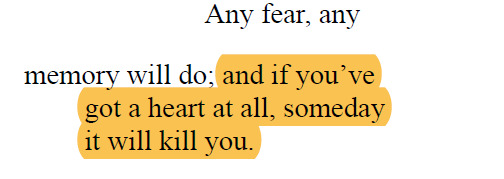
Rita Dove, “Primer for the Nuclear Age”, Collected Poems 1974-2004
[Text ID: “Any fear, any / memory will do; and if you’ve . got a heart at all, someday / it will kill you”]
#lit#quotes#poetry#rita dove#primer for the nuclear age#collected poems of rita dove 1974-2004#a heart is a heavy burden#typography#reading#m#x#all the world's a queue
16K notes
·
View notes
Photo


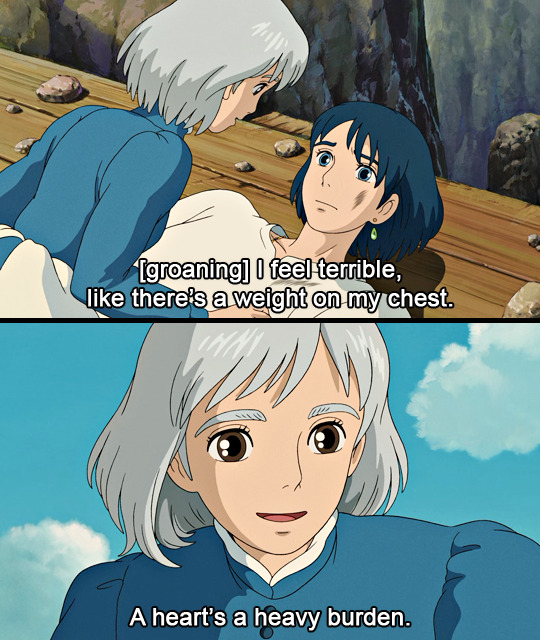
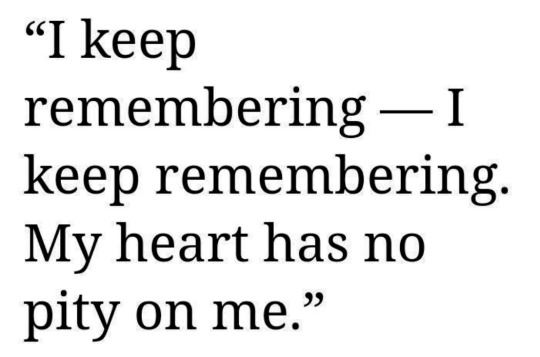
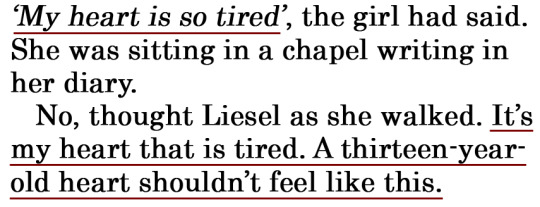
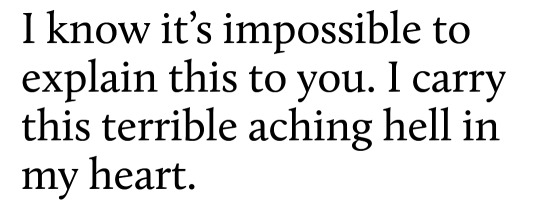
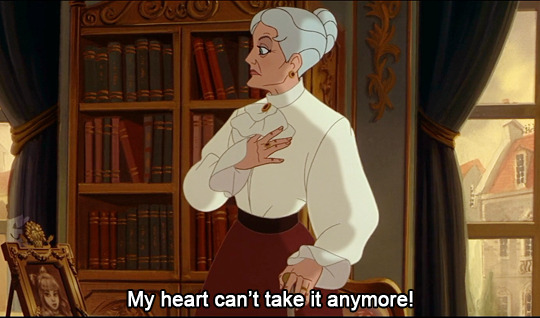
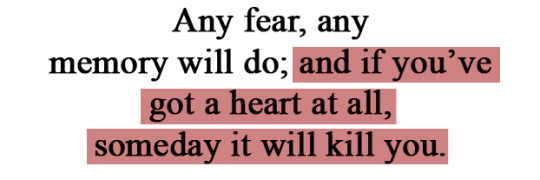

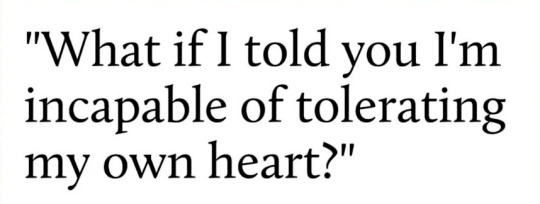
ghada al-samman // little women, louisa may alcott // howl’s moving castle, hayao miyazaki // the inferno, henri barbusse // the book thief, markus zusak // a letter to louise webb, charles bukowski // anastasia, don bluth & gary goldman // primer for the nuclear age, rita dove // san francisco poems or letters to jack, cathy linh che // night and day, virginia woolf
#yesh edits#heart#web weaving#words#parallels#little women#quotes#spilled ink#dark academia#dark academia aesthetic#literature#light academia#dark acadamia aesthetic#howl's moving castle#studio ghibli#anastasia#poetry#the book thief#art#virginia woolf#queue of nothing#looks like i'm back with my word shenanigans lol
2K notes
·
View notes
Text
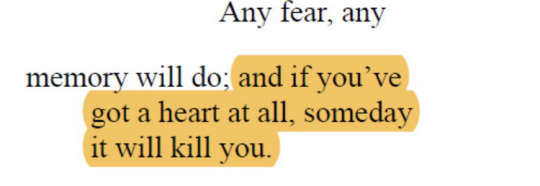
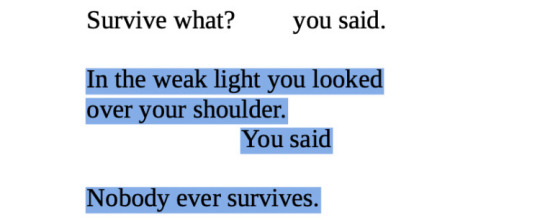



[transcript: 1. “any fear, any memory will do; and if you’ve got a heart at all, someday it will kill you.”
2. “survive what? you said. in the weak light you looked over your shoulder. you said, nothing ever survives.”
3. “because you want to die for love, you always have.”
4. “jesus: you think suffering is a one-way street?! it’s not! it’s the exact opposite of not!
judas: you got a lot of fuckin’ nerve—
jesus: —and you’ve got no nerve at all! where’s your heart in all this, judas? you think you were with me for any other reason than that?! it was your heart, judas. you were all heart. you were my heart! don’t you know that?!”
5. “he thought about wanting to feel like he had been made for something more than dying.”/end transcript]
rita dove, primer for a nuclear age/margaret atwood, roominghouse, winter/richard siken, planet of love/stephen adly guirgis, the last days of judas iscariot/maggie stiefvater- mister impossible
#odhran.txt#web weaving#intertextuality#lit stacks#compilations#quote compilation#parallels#richard siken#margaret atwood#the last days of judas iscariot#stephen adly guirgis#rita dove#the dreamer trilogy#the raven cycle#ronan lynch#mister impossible#userjamie
738 notes
·
View notes
Text


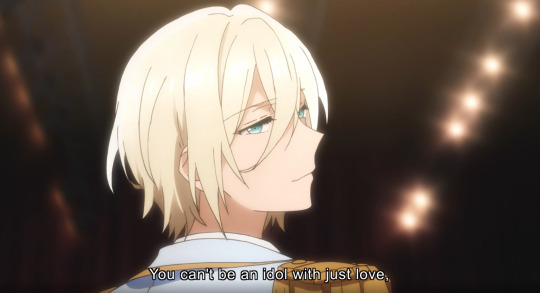
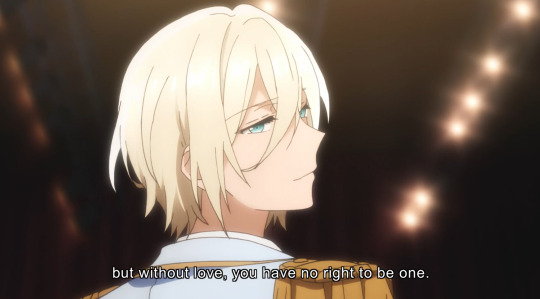
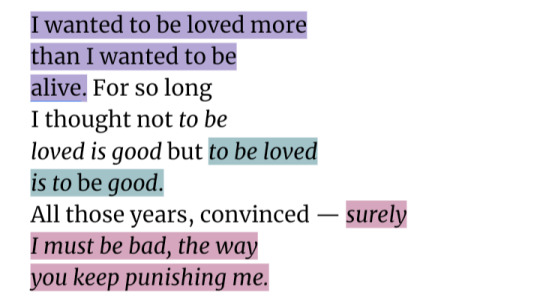

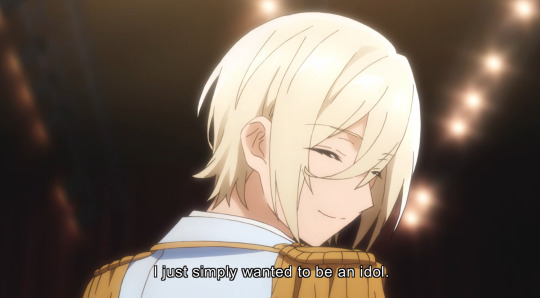
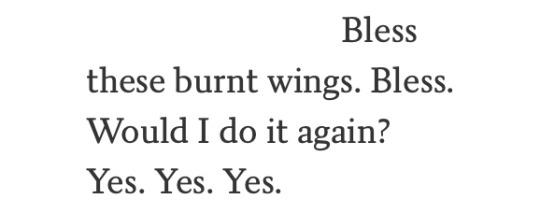

Eichi Tenshouin + Love
[ Ada Limón - "Bright Dead Things" | Rita Dove - “Primer for the Nuclear Age” |Leila Chatti - "Faulty" | Mary Shelley - "Frankenstein" | Erika L. Sánchez - "Departure" | Nikki Giovanni - Unknown ]
#Something about how Eichi was never taught or shown love when he was growing up#Which is why he showed his love + care in such a dysfunctional way#finn.txt#enstars#eichi tenshouin#ensemble stars
92 notes
·
View notes